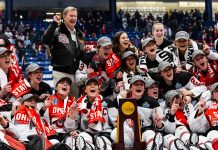As a rookie head coach, Brian Riley found out what it’s like to be challenged.
Besides the fact that Riley’s brother Rob, his predecessor, had left him one of the youngest lineups in the country last year, an early-season injury to goaltender Brad Roberts really put Riley behind the eight-ball in season one.
One year later, though, Riley and his club seem on the way to better things. A more experienced team at West Point will try this year to pull out of the bottom of the league and, if that happens to come true, it’s highly likely that there will be one man there leading the charge.
Roberts, now back to health, is the number-one key to Army’s success this season. Riley hopes that Roberts can return to the form that, as a freshman, earned the rookie goaltender first team all-MAAC honors.
“I tell people all the time, ‘As Brad goes, that’s how we’ll go,'” said Riley. “Brad loves being in the position [to carry a team]. He’s a hard worker on and off the ice and I know that he’s looking to end his career in this league on a big note.
“The biggest thing that we hope can happen is that he stays healthy.”
Assuming Roberts can perform up to task, Army can then turn its attention to its offense, or lack of offense, as may be the case. Last year, Army was the only team in the league to average fewer than two goals per game. The Black Knights’ power-play unit was anemic at best, something Riley hopes to focus on and change very early.
“Scoring goals and the inability to score on the power play were our biggest problems last year,” said Riley. “If we’re going to improve as a team we certainly need to improve in those two areas.”
In addressing the power-play issue, Riley will look for a player to step up and take charge.
“Finding that right person to quarterback the power play unit is something we’ll have to do,” said Riley. “We don’t have a lot of natural goal-scorers on our roster, so a lot of the goals we’re going to score are going to have to come from hard work and finding a way to bury a rebound or something.”
The gritty mentality that Riley wants on the power play will, he hopes, carry throughout the entire club. It’s obvious to Riley that this isn’t going to be a club of prodigious goal-scorers, but rather a blue-collar team with only a few highlight-reel goals to show.
“Everyone expects when you play against Army that you’re playing a physical, disciplined and mentally tough team,” Riley said. “So [we have to] make sure that we’re all of those things. If you’re not, other teams will come in and take advantage of you.”
If Riley likes any one thing best about his team, it’s the leadership. And if there’s one player who needs to act on that leadership, it’s captain Seth Beamer. Last season, Beamer scored just 14 points, down from 18 the year prior. If this Army offense is to break out of its shell, Beamer will need to lead by example and hopefully have plenty of followers.


